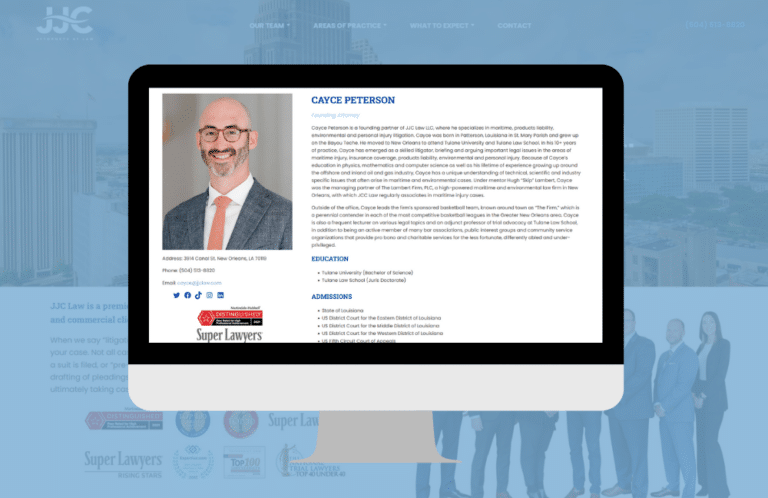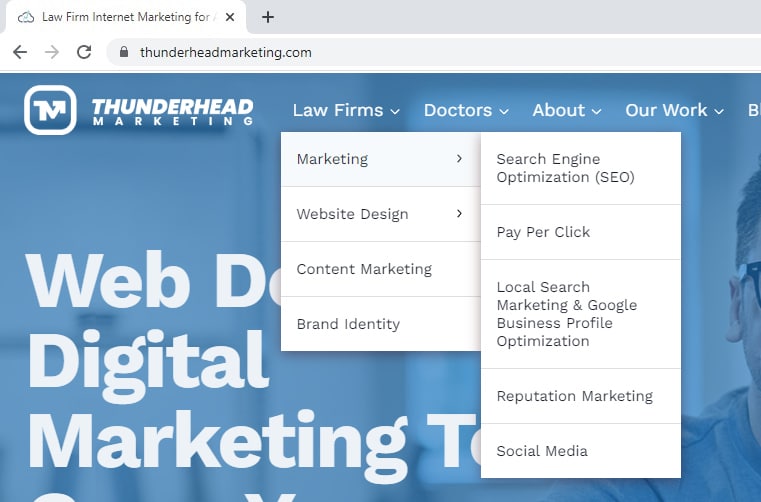The management of a lawyer’s online reputation is an often overlooked yet critical aspect of legal marketing. In a competitive legal landscape, attorneys must cultivate and maintain an online reputation that reflects trust, expertise, and a commitment to exceptional client service to thrive.
At Thunderhead Marketing, we specialize in the niche of legal marketing with a laser focus on attorneys. Through this comprehensive guide, we explore the art and science of online reputation management for lawyers, equipping legal professionals with actionable strategies to bridge the gap between traditional client service and their digital presence.
From navigating the shifting dynamics of client expectations to mastering the digital tools at your disposal, this ultimate checklist for lawyer reputation management will serve as your guide to elevating your professional standing in a world where the lines between online and offline reputations are increasingly blurred.
The Impact of Online Reviews
The internet serves as the first resource for most individuals seeking legal services, and online reviews are now pivotal in shaping an attorney’s reputation. Platforms like Google, Avvo, and Yelp have become the modern town squares, where client testimonials can significantly influence public perception of a lawyer’s practice. These digital endorsements carry substantial weight, often serving as the deciding factor for prospective clients choosing legal representation.

The Digital Word-of-Mouth
Online reviews function as the digital equivalent of word-of-mouth recommendations, profoundly influencing client decision-making. A positive review enhances an attorney’s credibility, portraying them as knowledgeable, reliable, and empathetic, which can attract more clients. On the other hand, negative feedback — even if it doesn’t accurately reflect the quality of service — can deter potential clients. This digital word-of-mouth transcends personal networks, reaching a wide audience of prospective clients actively seeking legal representation.
The Psychology Behind Reviews
The power of online reviews in client decision-making stems from social proof, a psychological phenomenon where individuals look to the experiences of others to guide their own choices. When clients share positive experiences, it strengthens the lawyer’s reputation and instills confidence in potential clients. This trust is especially critical in the legal field, where selecting the right attorney can have profound personal or financial implications.
Turning a Negative Review into a Positive
While positive reviews can bolster an attorney’s reputation, negative reviews present an opportunity for reflection and growth. They can highlight areas for improvement, such as communication, responsiveness, or billing practices. Additionally, how a lawyer or their firm responds to negative feedback can demonstrate professionalism and a commitment to client satisfaction. A thoughtful, empathetic response can not only mitigate the impact of a negative review but also showcase the attorney’s dedication to resolving concerns and providing excellent service.
The Checklist for Managing Attorney Reputation
Online reputation management for attorneys is a continuous process that demands attention, strategy, and a proactive approach. To effectively navigate this landscape, we’ve developed a checklist tailored to help lawyers elevate their online presence and build stronger relationships with current and prospective clients. Following these steps can lead to a solid reputation that attracts new clients while fostering trust with existing ones.
1. Audit Existing Online Presence
- Search Your Name: Start by searching your name, your firm, and key practice areas on major search engines and legal review platforms like Avvo, Google, and Yelp. This gives insight into how clients perceive you.
- Evaluate Profiles and Reviews: Review your profiles on social media, legal directories, and review sites. Take note of the tone and content of client feedback.
- Identify Areas for Improvement: Look for recurring patterns in client reviews, both positive and negative. Use these insights to guide your reputation management strategy.
2. Claim and Optimize Online Profiles
- Claim Profiles: Ensure you’ve claimed profiles on all relevant legal platforms, such as Avvo, Justia, and Google Business Profile.
- Update Information: Keep your contact details, office hours, and practice areas current. Accurate and consistent information builds client trust and enhances search engine rankings.
- Showcase Your Expertise: Highlight your areas of practice, certifications, and accolades on your profiles. Pull details from your website bio to reinforce your credentials.
3. Generate Positive Reviews
- Encourage Feedback: Politely ask satisfied clients to leave reviews on platforms like Google or Avvo. Make it convenient by providing direct links to your review profiles.
- Incentivize the Practice: While incentivizing reviews directly isn’t appropriate, fostering a culture of excellent client service naturally generates positive feedback. Recognize team members who contribute to client satisfaction.
4. Respond to Reviews
- Acknowledge Feedback: Respond to all reviews — positive or negative — in a professional, timely manner. Thank clients for their positive comments to show appreciation.
- Address Concerns: For negative reviews, acknowledge the issue respectfully and offer to resolve it privately. This demonstrates your commitment to addressing client concerns and improving your services.
5. Monitor Online Mentions
- Use Alerts: Set up Google Alerts or similar tools to stay updated on mentions of your name, your firm, and relevant practice areas.
- Regular Check-ins: Routinely check your online presence on review platforms and social media to stay informed about your reputation.
6. Engage with the Community
- Participate in Forums: Contribute to discussions in legal forums, blogs, or community platforms to showcase your expertise and build trust.
- Local Involvement: Attend or sponsor local events, bar association activities, or legal aid clinics to enhance your reputation and connect with prospective clients.
7. Content Creation
- Start a Blog: Use your website to publish articles on legal topics, frequently asked questions, and recent changes in the law that may impact your clients.
- Utilize Social Media: Share valuable legal tips, firm updates, and community involvement on platforms like LinkedIn, Facebook, and Instagram to maintain a strong, professional online presence.
8. Professional Networking
- Connect with Peers: Build relationships with other attorneys and professionals in complementary fields. These connections can lead to referrals and endorsements.
- Join Professional Associations: Actively participate in bar associations, legal organizations, or practice-specific groups to enhance your credibility and visibility.
By systematically addressing each item on this checklist, law firms can significantly improve their online reputation. Remember, reputation management is a marathon, not a sprint. Consistency, authenticity, and engagement are key to building and maintaining a reputation that reflects the high quality of service you provide.
Implementing the Reputation Checklist
Transitioning from understanding the importance of reputation management to actively implementing strategies can feel overwhelming for attorneys. However, breaking the process into manageable steps and incorporating these activities into your daily or weekly routine makes it achievable and less time-consuming.
Here’s how to practically apply the checklist, ensuring a comprehensive approach to enhancing your online presence and client relations:
Start with a Plan
- Prioritize Actions: After your initial audit, focus on the areas that require immediate attention, such as updating profiles, addressing recent reviews, or creating fresh content.
- Set Realistic Goals: Define clear, achievable goals for your reputation management efforts, such as improving your average rating on review sites or increasing client engagement on social media.
Incorporate into Daily Routine
- Dedicate Time: Allocate specific times in your week for reputation management tasks. Even 30 minutes can make a significant difference over time.
- Involve Your Team: Make reputation management a team effort. Assign roles and responsibilities to staff members, such as monitoring reviews or updating social media profiles.
Leverage Technology
- Use Tools and Software: Consider using reputation management software that can help monitor reviews, track online mentions, and even automate responses to certain types of feedback.
- Automate Where Possible: Use scheduling tools for social media posts and blog articles to maintain a consistent online presence without having to manually update each platform every day.
Engage with Your Audience
- Personal Touch: Personalize your responses to reviews and online interactions. This shows that you value client feedback and are committed to improving their experience.
- Stay Active: Regularly post fresh content, participate in discussions, and update your profiles to keep your online presence vibrant and engaging.
Making It a Part of Your Firm’s Culture
Incorporating reputation management into your firm’s culture is essential for long-term success. Foster an environment where every team member understands the importance of a positive online presence and actively contributes to maintaining it. Celebrate successes, learn from feedback, and strive for excellence in client service and digital engagement.
By thoughtfully implementing the checklist into your law firm’s operations and culture, you’re not just managing your reputation; you’re actively shaping the narrative of your professional legacy. This proactive approach to attorney reputation management not only enhances your online presence but also strengthens the trust and loyalty of your clients, paving the way for a thriving law firm rooted in excellence and integrity.
Don’t Have Time for Reputation Management? Our Experts Can Help
Effectively managing your online reputation is essential but often time-consuming and complex. You became a lawyer to advocate for your clients, not to spend hours navigating the complexities of digital marketing. If reputation management feels overwhelming or takes time away from serving your clients, Thunderhead Marketing can take the reins.
With our reputation management services, you get:
- Tailored Support for Busy Attorneys: Your primary focus is advocating for your clients. Let us handle your online presence so you can dedicate your time to what matters most — delivering exceptional legal representation.
- Expert Strategies, Minimized Effort: Leveraging our expertise in legal marketing and reputation management, we implement effective strategies that require minimal effort on your part but yield maximum results.
- Achieve More, Stress Less: Your reputation is critical, but managing it doesn’t have to be a burden. Our services streamline the process, giving you peace of mind while allowing you to focus on your legal practice.
With our support, you can strengthen your online presence, attract more clients, and build a more trusted, reputable legal practice — all without taking time away from your essential work.
Measuring Success Is Key

Measuring the results of your efforts is essential to understanding what strategies are effective and where improvements can be made. Success in managing your online reputation can be tracked using various metrics that evaluate your digital presence and its impact on client acquisition and retention. Here are the key indicators to monitor and assess the success of your reputation management initiatives
Online Rating Improvements
- Average Star Ratings: Monitor the average star ratings on key review platforms over time. An upward trend is a strong indicator of success in managing your online reputation.
- Number of Positive Reviews: Keep track of the number of positive reviews you receive across platforms. An increase in positive feedback reflects a growing satisfaction among your clients.
Search Engine Rankings
- Visibility in Search Results: Monitor your ranking in search results for relevant legal terms, such as “personal injury attorney near me” or “[specific practice area] lawyer.” Improved rankings signal effective SEO and a growing online reputation.
- Local Listings Performance: If your practice serves a specific geographic area, prioritize visibility in local search results on platforms like Google Business Profile. Strong performance here often aligns with increased trust and client inquiries.
Client Feedback and Engagement
- Client Surveys: Use surveys or direct feedback tools to assess client satisfaction. Monitor trends in responses to identify areas of success and opportunities for improvement.
- Engagement on Social Media: Analyze interactions with your content on platforms like LinkedIn or Facebook, such as likes, shares, and comments. High engagement indicates that your content resonates with your audience and enhances your professional image.
Website Traffic and Conversion Rates
- Website Analytics: Track your website’s traffic, especially visits from organic search and local queries. Growth in traffic reflects increased online visibility and interest.
- Appointment Bookings: Monitor the number of new client inquiries or consultations booked via your website or phone. An increase demonstrates the tangible impact of your reputation management efforts.
Referrals and Client Retention
- Referral Rates: Track how many new clients are referred to your firm by existing clients or professional contacts. Strong referral rates indicate trust and satisfaction.
- Client Retention Rates: Measure the rate at which existing clients return for additional legal services. High retention reflects the strength of your relationships and reputation.
Benchmarking Against Goals
Define clear, measurable objectives at the start of your reputation management efforts and regularly evaluate your progress. Goals like raising your average review rating, boosting positive feedback by 20%, or achieving higher rankings in search results will keep your efforts focused and provide tangible benchmarks for success.
Continuous Improvement
Reputation management is an ongoing process, not a one-time effort. The digital landscape and client expectations are constantly evolving, requiring regular evaluation and strategy refinement. Continuously track your metrics, celebrate successes, and address areas for improvement. This iterative approach will help you maintain a strong online presence and position your firm for long-term success in an increasingly competitive legal market.
Your Reputation Deserves Expert Care
If managing your online reputation feels overwhelming or if you’d rather focus your energy on serving your clients, Thunderhead Marketing is here to help. We specialize in simplifying the complexities of digital reputation management, turning them into success stories for attorneys like you. Don’t let the demands of the digital world pull you away from your passion! Let Thunderhead Marketing elevate your online presence while you continue making a difference for your clients. Contact us today to learn more about our online reputation management services for lawyers.
Want to know how your online reputation compares to your competitors? Get your free reputation scorecard here.







